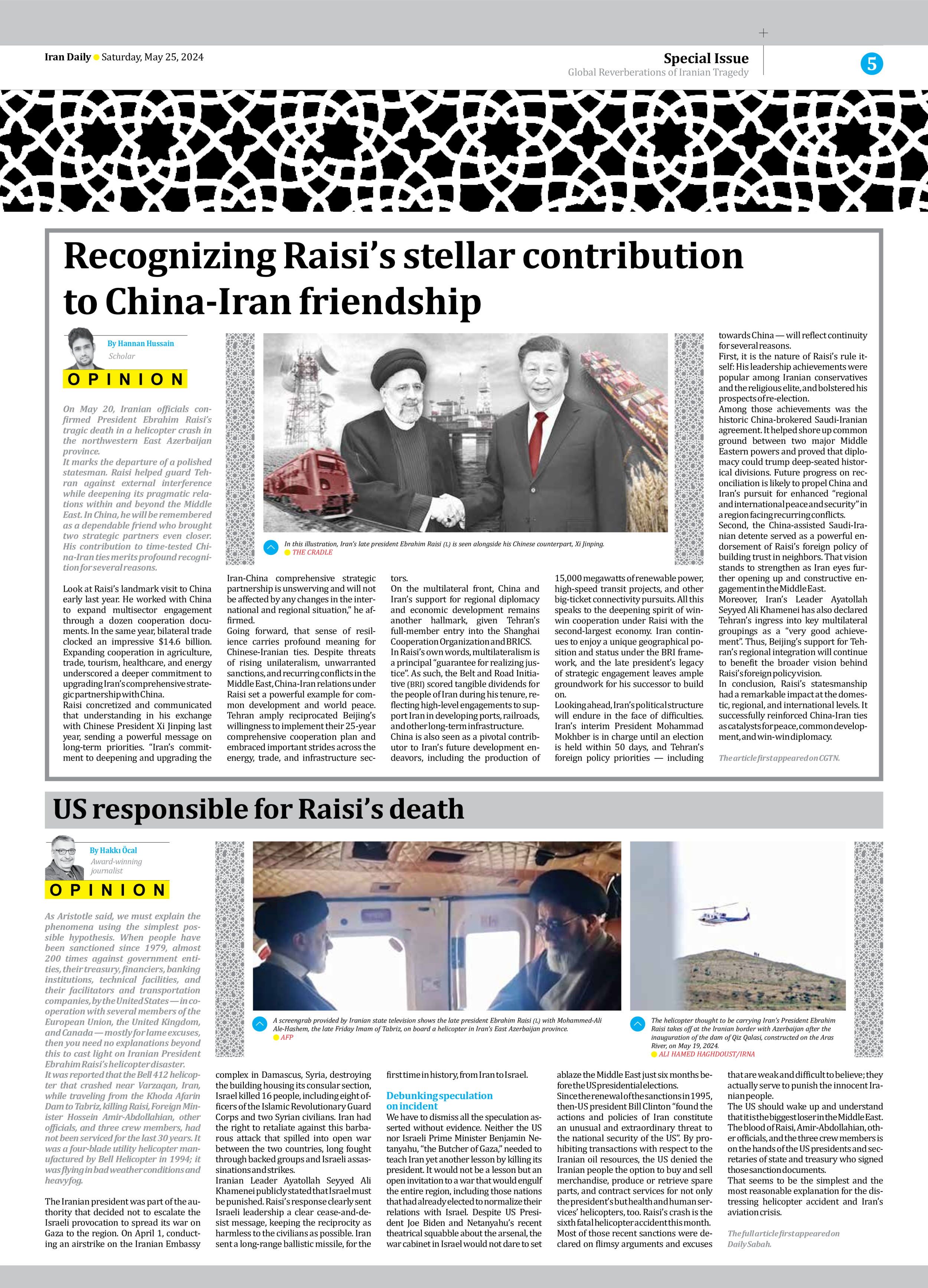
Recognizing Raisi’s stellar contribution to China-Iran friendship
By Hannan Hussain
Scholar
On May 20, Iranian officials confirmed President Ebrahim Raisi’s tragic death in a helicopter crash in the northwestern East Azerbaijan province.
It marks the departure of a polished statesman. Raisi helped guard Tehran against external interference while deepening its pragmatic relations within and beyond the Middle East. In China, he will be remembered as a dependable friend who brought two strategic partners even closer. His contribution to time-tested China-Iran ties merits profound recognition for several reasons.
Look at Raisi’s landmark visit to China early last year. He worked with China to expand multisector engagement through a dozen cooperation documents. In the same year, bilateral trade clocked an impressive $14.6 billion. Expanding cooperation in agriculture, trade, tourism, healthcare, and energy underscored a deeper commitment to upgrading Iran’s comprehensive strategic partnership with China.
Raisi concretized and communicated that understanding in his exchange with Chinese President Xi Jinping last year, sending a powerful message on long-term priorities. “Iran’s commitment to deepening and upgrading the Iran-China comprehensive strategic partnership is unswerving and will not be affected by any changes in the international and regional situation,” he affirmed.
Going forward, that sense of resilience carries profound meaning for Chinese-Iranian ties. Despite threats of rising unilateralism, unwarranted sanctions, and recurring conflicts in the Middle East, China-Iran relations under Raisi set a powerful example for common development and world peace. Tehran amply reciprocated Beijing’s willingness to implement their 25-year comprehensive cooperation plan and embraced important strides across the energy, trade, and infrastructure sectors.
On the multilateral front, China and Iran’s support for regional diplomacy and economic development remains another hallmark, given Tehran’s full-member entry into the Shanghai Cooperation Organization and BRICS.
In Raisi’s own words, multilateralism is a principal “guarantee for realizing justice”. As such, the Belt and Road Initiative (BRI) scored tangible dividends for the people of Iran during his tenure, reflecting high-level engagements to support Iran in developing ports, railroads, and other long-term infrastructure.
China is also seen as a pivotal contributor to Iran’s future development endeavors, including the production of 15,000 megawatts of renewable power, high-speed transit projects, and other big-ticket connectivity pursuits. All this speaks to the deepening spirit of win-win cooperation under Raisi with the second-largest economy. Iran continues to enjoy a unique geographical position and status under the BRI framework, and the late president’s legacy of strategic engagement leaves ample groundwork for his successor to build on.
Looking ahead, Iran’s political structure will endure in the face of difficulties. Iran’s interim President Mohammad Mokhber is in charge until an election is held within 50 days, and Tehran’s foreign policy priorities — including towards China — will reflect continuity for several reasons.
First, it is the nature of Raisi’s rule itself: His leadership achievements were popular among Iranian conservatives and the religious elite, and bolstered his prospects of re-election.
Among those achievements was the historic China-brokered Saudi-Iranian agreement. It helped shore up common ground between two major Middle Eastern powers and proved that diplomacy could trump deep-seated historical divisions. Future progress on reconciliation is likely to propel China and Iran’s pursuit for enhanced “regional and international peace and security” in a region facing recurring conflicts.
Second, the China-assisted Saudi-Iranian detente served as a powerful endorsement of Raisi’s foreign policy of building trust in neighbors. That vision stands to strengthen as Iran eyes further opening up and constructive engagement in the Middle East.
Moreover, Iran’s Leader Ayatollah Seyyed Ali Khamenei has also declared Tehran’s ingress into key multilateral groupings as a “very good achievement”. Thus, Beijing’s support for Tehran’s regional integration will continue to benefit the broader vision behind Raisi’s foreign policy vision.
In conclusion, Raisi’s statesmanship had a remarkable impact at the domestic, regional, and international levels. It successfully reinforced China-Iran ties as catalysts for peace, common development, and win-win diplomacy.
The article first appeared on CGTN.







